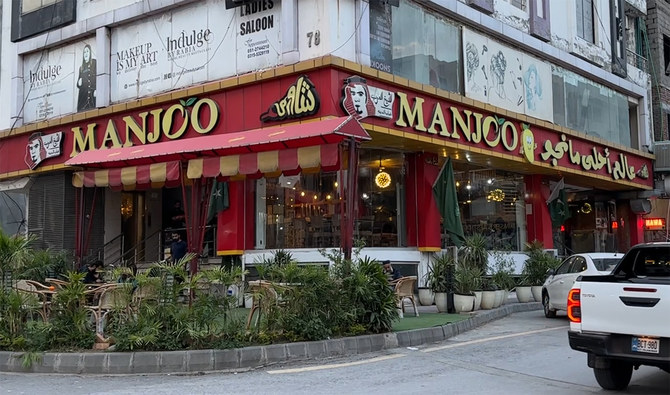RAWALPINDI: Waiters prepared shawarma platters inside the bustling kitchen while eager customers waited to collect their orders in the dining room outside, surrounded by the aroma of skewered meat and spicy rice.
This is the scene at the “Manjoo” fast food chain, set up four years ago in Rawalpindi by two Pakistani brothers who grew up in Saudi Arabia and opened the restaurant’s first branch in the Kingdom in 2009.
Some of the popular dishes on the menu are shawarmas, seasoned meat and condiments served on pita bread, a meat and spicy rice dish called mandi and fatayer, which are small, triangular-shaped pastries filled with spinach, cheese, meat, or a combination.
Sheikh Tahir, one of the brothers who set up the Rawalpindi branch, said his family moved to Saudi Arabia before he was born and set up various businesses there, including automobile showrooms and mobile phone shops.
“We had other businesses there [in Saudi Arabia] but [younger generation] always wanted to open a restaurant,” Tahir told Arab News.
That dream materialized in 2009 when the family opened its first Manjoo branch in Madinah.
One branch grew to five across Saudi Arabia, before the family decided to open a branch and a food truck in Pakistan.
But what does Manjoo mean and why this name specifically?
“Manjoo means mango in Arabic,” Tahir explained, saying Saudi mangoes were cherished fruits available throughout the year.
“In 2009, before we opened the restaurant, we randomly chose this name, and it quickly gained fame.”
Tahir’s family was skeptical at first whether a restaurant that offered food from the Middle East would be a hit in Pakistan. But the response from customers had been “overwhelming,” the owner said, which he credited to a growing taste for Middle Eastern cuisine in Pakistan.
“Earlier, people in Pakistan were not acquainted to Arab food but now many such restaurants have opened up,” Tahir said.
“And this food is liked by the people because it’s light and has very few spices.”
To ensure the restaurant does not lose its authentic taste, Tahir even brings in chefs from Saudi Arabia. And the customers love it.
“I come here at least twice a week,” customer Ali Fayaz told Arab News. “Having spent a lot of time in Saudi Arabia and other Arab countries, my taste buds are accustomed to their cuisine.”
Another customer Syed Noman Sarwar praised the restaurant, which his family had been visiting for over three years, for maintaining consistency in taste and quality.
“I have tried KFC, McDonald’s,” he said, “but nothing compares to the taste of Manjoo.”












